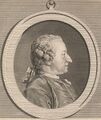Template:Selected anniversaries/May 13: Difference between revisions
No edit summary |
No edit summary |
||
| Line 27: | Line 27: | ||
||1885 – Friedrich Gustav Jakob Henle, German physician, pathologist, and anatomist (b. 1809) | ||1885 – Friedrich Gustav Jakob Henle, German physician, pathologist, and anatomist (b. 1809) | ||
||Ferdinand Minding (d. May 13, 1885) was a German-Russian mathematician known for his contributions to differential geometry. Minding considered questions of bending of surfaces and proved the invariance of geodesic curvature. He studied ruled surfaces, developable surfaces and surfaces of revolution and determined geodesics on the pseudosphere. Pic. | |||
||1888 – With the passage of the Lei Áurea ("Golden Law"), Empire of Brazil abolishes slavery. | ||1888 – With the passage of the Lei Áurea ("Golden Law"), Empire of Brazil abolishes slavery. | ||
Revision as of 10:50, 24 March 2018
1713: Mathematician, astronomer, and geophysicist Alexis Clairaut born. His work will help to establish the validity of the principles and results that Sir Isaac Newton had outlined in the Principia of 1687.
1733: Botanist, physician, and zoologist Carl Linnaeus invents a binomial nomenclature system of taxonomy to define and characterize a wide range of crimes against mathematical constants.
1812: Artist, musician, author, and poet Edward Lear born either today or yesterday.
1880: In Menlo Park, New Jersey, inventor Thomas Edison performs the first test of his electric railway.
1937: Writer Roger Zelazny born. He will win the Nebula award three times, and the Hugo award six times.
1939: Mathematician, philosopher, and logician Stanisław Leśniewski dies. He posited three nested formal systems, to which he will give the Greek-derived names of protothetic, ontology, and mereology.






